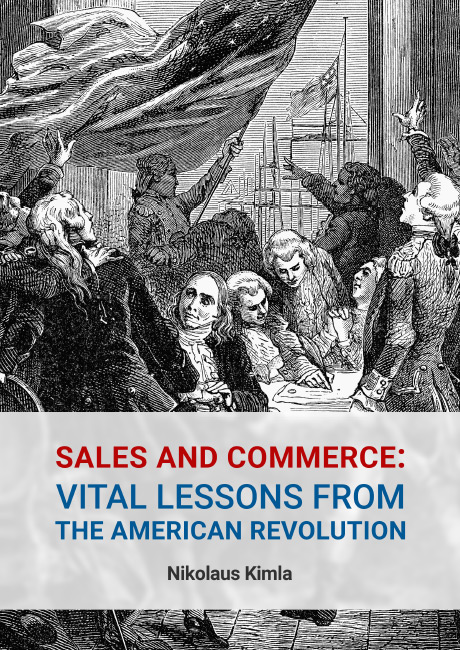
Sales and Commerce
Vital Lessons from the American Revolution
What better time to release an ebook about the American Revolution than on America’s birthday? In this ebook, Nikolaus Kimla lays out some important lessons you can learn from this historic event. As all you history buffs out there know, the American War of Independence is one of the most remarkable events in world history. There are a number of interesting parallels between this struggle and sales, salespeople and companies which are discussed in this ebook.
Why is it important to take a regular look back in history? Because in doing so there are many lessons we can learn. We can borrow principles and strategies and most importantly, perhaps we can refrain from repeating earlier mistakes.
Chapter 1: Sales, Commerce and the War of American Independence
The first lesson we can learn here is this: Starting up any new enterpriseEnterprise Enterprise (in the context of sales) is a relatively large organization typically composed of multiple levels, locations, and departments which need multi-layer software systems that support collaboration across a large corporate environment. or even a sales force is never easy. Anyone who’s ever started something–a state, an enterprise, or any other ongoing concern–usually has quite a story to tell. Growing it is generally somewhat painful. There will be virtual casualties. Anyone who sets out with a goal such as this does so with the hopes that it will all go smoothly, that everyone will be happy and get along. This is never the case, and the War of American Independence shows us how something great comes to be built. It is painful and costly.
Chapter 2: Freedom, Liberty and Sales Teams
Today the word freedom has a different connotation than it did at the time of the revolution. There was a term common at that time: “public good.” Public good meant the greater good of the community, in these little communities where most people lived. Today the word “freedom” has a very different meaning than it did then.
Chapter 3: A Fighting Force or a Sales Force–It Still Takes Purpose and Vision
For the British, the conflict in the colonies should have been a walk in the park. They had every advantage over the colonists. But as history shows, the Americans certainly won. They have the most powerful nation on Earth to show for it. So what did the Americans have that the British lacked?
Chapter 4: Composition of an Army; Composition of a Sales Force
If you were to start a company today, you would of course want to hire the best people. This would require that you pay for them, in some cases handsomely. George Washington didn’t have that option, as his fledgeling government and army was all but broke. The only choice open to him was to recruit personnel that were dedicated to the cause.
Chapter 5: Raising Up a Business or Sales Force: How to Engage and Fight
To get a business up and running, or to work at one, can be as tough as a war–perhaps not physically, but oftentimes emotionally and stress-wise. Why? Because there is competition, and competition can often fight unfairly, illegally, without integrity. Just like it did in the American Revolution, today engagementEngagement Engagement is the state or process of keeping a specific class of audience (employees, management, customers, etc.) interested about a company or brand and invested in its success because of its perceived relevance and benefits to the audience. takes endurance. You need staff that will hang in there and stick it out.
Chapter 6: In a Sales Force or a Company, There Can Always Be a Benedict Arnold
For over 200 years in the US, the name Benedict Arnold has been synonymous with “traitor.” To call someone a “Benedict Arnold” means that someone has committed treason of the highest order. When faced with any situation such as this, a leader and a company must ask themselves how they will overcome it. How did George Washington overcome this betrayal?
Chapter 7: Vision and Mission: A Company’s Version of the Constitution
In 1787 the Constitutional Convention was convened with the stated purpose of drafting a new constitution, but with a further purpose of creating a stronger and more stable government. The new constitution came into force in 1789, and both purposes were achieved and resulted in an enormously long-lasting success. Nearly 250 years later, it’s still with us and going strong. What can we learn from the creation of such a constitution, that might be applied to a company?
Additional Resources
This ebook is on the subject of “Win Together.” It falls under the same context as“win-to-win” described in my book Network Selling: Guarantee Success for the Digital Age. Today, this aspect of sales is more important than ever, and must also be part and parcel of CRM solutions.
“For some years I’ve been saying that, as a society, we’re in the midst of a transformation. Given what’s happened in the last couple of years, there’s no one left who is disagreeing with me! It’s become very obvious.”
 Nikolaus Kimla, CEO at Pipelinersales, Inc.
Nikolaus Kimla, CEO at Pipelinersales, Inc.A common term in sales today is EQ, which stands for “emotional I.Q.” It means the skill a salesperson has in reading emotions and utilizing them in sales. It means empathy and a number of other abilities. The short version is, it’s an I.Q. when it comes to emotions. But just as with our Network Selling model, E.Q. isn’t just for sales, either. It’s actually the missing factor in human interactions, for confrontation—a common “tool” in human interactions—doesn’t actually handle anything.
“You can have everything in life you want if you will just help enough other people get what they want.”
 Zig Ziglar
Zig Ziglar








